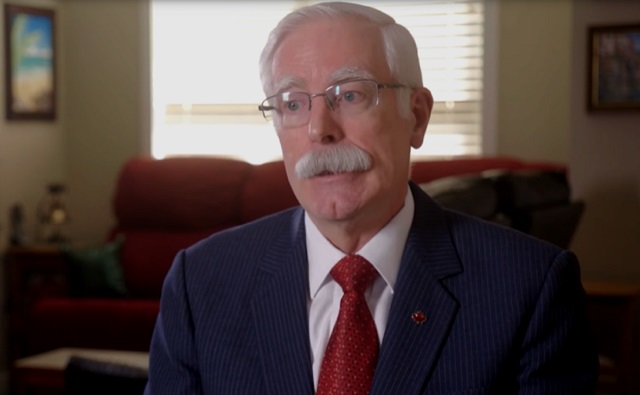Alberta
Redman got it right on COVID response

From the Frontier Centre for Public Policy
By Linda Slobodian
“The fear is still, I would say, in 65% of our population. They are now self-destroying their Charter of Rights and Freedoms.”
Emergency response expert and retired Lt. Col. David Redman tirelessly tried to warn everyone that the “incoherent” chaotic response to COVID-19 was dangerously flawed.
The powers in charge didn’t listen to Redman, a globally respected authority who led Alberta’s Emergency Management Agency (AEMA) for five years and served 27 years with the Canadian Armed Forces.
But finally, Redman’s dire warnings, concerns, and suggested response to dealing with a pandemic were validated by recommendations made by the Public Health Emergencies Governance Review Panel (PHEGRP) in a report submitted to the Alberta government last week.
What the government does with the recommendations remains to be seen.
But steps must be taken to hold decision-makers accountable for “gross negligence” and to help people break out of COVID’s needless “cycle of fear” that still cripples too many, Redman told the Western Standard Friday.
“Canada will pay the costs of this deadly response for decades to come,” said Redman.
Redman’s letters early on to Canada’s premiers warning them that discarding emergency management principles and placing health care officials in charge of pandemic response was dangerous, were ignored.
AEMA strategies, prepared in advance and in place to deal with pandemics, collected dust. Redman led the team that wrote the 2005 Pandemic Influenza Response Plan that was updated in 2014.
Emergency management offices — fully equipped and staffed with experts — in every province and territory were shut out.
Under the direction of health officials, the public was under siege. Punished for disobeying mandates. Subjected to unnecessary lockdowns and school closures. And controlled by a fear factor that defied a tenet of emergency management experts.
“They did it on purpose. They used fear as a weapon. In emergency management you never use fear. You use confidence. You show confidence that the emergency can be handled and present a plan to show how this will be achieved,” said Redman.
He said it is deeply disturbing that people still believe they must keep vaccines up to date and self-isolate. And that must be rectified if even possible.
“The fear that this government generated — by this government I mean every provincial, territorial government, and in particular the federal government — created for two straight years, only broken by the Freedom Convoy — will last until the children that were just entering school in 2020 die.”
Redman said the COVID-19 response was the “exact opposite” of an emergency management response.
“The pandemic response was health only focussed with terrible and deadly costs to individual mental health, societal health, our children, other serious illnesses and diseases, economic viability, and our democratic way of life simply ignored.”
“Unless there is an emergency management plan built, these costs will continue to be massive.”
Well, there’s hope.
The PHEGRP submitted its final report with more than 90 recommendations.
The panel was established by Premier Danielle Smith in January to review the government’s legislation and governance practices to manage the COVID-19 pandemic.
“It is my hope that by adopting these recommendations, the Government will be better equipped to cope with future emergencies and that the impacts on Albertans — their personal livelihoods, civil liberties and mental health — can be mitigated to the greatest extent possible,” said PHEGRP Chair and former Reform party leader Preston Manning in a press release.
Key recommendations include strengthening the AEMA through legislative amendments and budgetary provisions to make it the lead government agency responding to and coordinating the government’s response to future public emergencies.
Redman is “very happy” with Manning’s recommendations.
“There’s a lot of meat in what he’s written.”
“The first and foremost recommendation overarching his whole report is that legislation need to be changed to ensure that the emergency management process and emergency managers are in charge of every emergency including the next pandemic.”
“And that that the AEMA is appropriately funded and staffed to do their new far extended role.”
“He didn’t just say the legislation needs to be changed. He said the government needs to build and fund that organization to be responsible for response for every emergency including pandemics.”
Redman, who testified at the National Citizens Inquiry in Red Deer last April, was pleased with Manning’s wide scope.
“In the first line of each recommendation he’s covered all of the areas from fear being number one, to not doing a hazard assessment to realize that Sars-CoV-2 was really only affecting the elderly.”
“And the terrible destruction of the children and their education system, but more importantly their socialization, the effects on business, the destruction of our economy, and then summing it up with the complete destruction of rights and freedoms.”
“I think they’ve pretty much covered the areas.”
Redman said two steps must be followed immediately.
First, hold a public inquiry to educate the public and “break the cycle of fear.”
“The fear is still, I would say, in 65% of our population. They are now self-destroying their Charter of Rights and Freedoms.”
“They believe Sars-C0V-2, the sixth version of the common cold, is deadly. And they will keep believing it until we do a full, open, transparent public inquiry to teach people that what we did was absolutely wrong and why it was wrong.”
“Step two, there must be a process-driven full-recovery plan … That recovery process has to be complete, covering all the points in the Manning report and any that he might have missed.”
“Again, it must be transparent. And that plan has to be fully implemented with the ability to hold accountable everyone responsible for the gross negligence and criminal negligence that was done during COVID.”
“That will show to the public that what was done wasn’t just wrong, it was criminally wrong, and they can stop the fear.”
The inquiry must address what was done, why and “how do we recover from all of the damage we’ve done.”
“Let’s use children as an example. How do you overcome the loss of academic training. And how do you overcome two years of lack of socialization?”
If the emergency management recommendation is implemented by Smith’s government, citizens can be confident if/when the next pandemic hits.
“Emergency management is made up of professionals who are experts who evaluate daily hazards. They use a disciplined process to mitigate, prepare for, respond to and recovery from all hazards in their jurisdiction,” said Redman.
“The process they use ensures that all required experts, across the public and private sector, are involved in making a plan that evaluates the cost versus the benefits of all possible actions, making a coherent plan that is issued to the public for their engagement and feedback.”
Alberta’s pandemic plan is designed to control the spread of disease, reduce mortality, mitigate societal disruption, minimize adverse economic impact, and support efficient and effective use of recourses during response and recovery.
The Manning report recognized the delicate balance in protecting Albertans during emergencies and honouring rights and freedoms.
It recommended amending the Alberta Bill of Rights, Employment Standards Code, and Health Professions Act to protect the rights and freedoms of all Albertans, including workers and healthcare professionals and freedom of expression during emergencies.
Manning noted that too many Canadians suffered losses — including loved ones, jobs due to “rigorous health protection measures,” businesses, and freedoms.
How different would things have been if people like Redman had been listened to at the time…
Linda Slobodian is the Senior Manitoba Columnist for the Western Standard based out of Winnipeg. She has been an investigative columnist for the Calgary Herald, Calgary Sun, Edmonton Sun, and Alberta Report. This originally appeared in the Western Standard here.
Alberta
Alberta announces citizens will have to pay for their COVID shots

From LifeSite News
The government said that it has decided to stop ‘waste’ by not making the shots free starting this fall.
Beginning this fall, COVID shots in the province will have to be pre-ordered at the full price, about $110, to receive them. (This will roll out in four ‘phases’. In the first phases COVID shots will still be free for those with pre-existing medical conditions, people on social programs, and seniors.)
The UCP government in a press release late last week noted due to new “federal COVID-19 vaccine procurement” rules, which place provinces and territories as being responsible for purchasing the jabs for residents, it has decided to stop “waste” by not making the jab free anymore.
“Now that Alberta’s government is responsible for procuring vaccines, it’s important to better determine how many vaccines are needed to support efforts to minimize waste and control costs,” the government stated.
“This new approach will ensure Alberta’s government is able to better determine its overall COVID-19 vaccine needs in the coming years, preventing significant waste.”
The New Democratic Party (NDP) took issue with the move to stop giving out the COVID shots for free, claiming it was “cruel” and would place a “financial burden” on people wanting the shots.
NDP health critic Sarah Hoffman claimed the move by the UCP is health “privatization” and the government should promote the abortion-tainted shots instead.
The UCP said that in 2023-2024, about 54 percent of the COVID shots were wasted, with Health Minister Adriana LaGrange saying, “In previous years, we’ve seen significant vaccine wastage.”
“By shifting to a targeted approach and introducing pre-ordering, we aim to better align supply with demand – ensuring we remain fiscally responsible while continuing to protect those at highest risk,” she said.
The UCP government said that the COVID shots for the fall will be rolled out in four phases, with those deemed “high risk” getting it for free until then. However, residents who want the shots this fall “will be required to pay the full cost of the vaccine, the government says.”
The jabs will only be available through public health clinics, with pharmacies no longer giving them out.
The UCP also noted that is change in policy comes as a result of the Federal Drug Administration in the United States recommending the jabs be stopped for young children and pregnant women.
The opposite happened in Canada, with the nation’s National Advisory Committee on Immunization (NACI) continuing to say that pregnant women should still regularly get COVID shots as part of their regular vaccine schedule.
The change in COVID jab policy is no surprise given Smith’s opposition to mandatory shots.
As reported by LifeSiteNews, early this year, Smith’s UCP government said it would consider halting COVID vaccines for healthy children.
Smith’s reasoning was in response to the Alberta COVID-19 Pandemic Data Review Task Force’s “COVID Pandemic Response” 269-page final report. The report was commissioned by Smith last year, giving the task force a sweeping mandate to investigate her predecessor’s COVID-era mandates and policies.
The task force’s final report recommended halting “the use of COVID-19 vaccines without full disclosure of their potential risks” as well as outright ending their use “for healthy children and teenagers as other jurisdictions have done,” mentioning countries like “Denmark, Sweden, Norway, Finland, and the U.K.”
The mRNA shots have also been linked to a multitude of negative and often severe side effects in children and all have connections to cell lines derived from aborted babies.
Many Canadian doctors who spoke out against COVID mandates and the experimental mRNA injections were censured by their medical boards.
LifeSiteNews has published an extensive amount of research on the dangers of the experimental COVID mRNA jabs that include heart damage and blood clots.
Alberta
Alberta’s grand bargain with Canada includes a new pipeline to Prince Rupert

From Resource Now
Alberta renews call for West Coast oil pipeline amid shifting federal, geopolitical dynamics.
Just six months ago, talk of resurrecting some version of the Northern Gateway pipeline would have been unthinkable. But with the election of Donald Trump in the U.S. and Mark Carney in Canada, it’s now thinkable.
In fact, Alberta Premier Danielle Smith seems to be making Northern Gateway 2.0 a top priority and a condition for Alberta staying within the Canadian confederation and supporting Mark Carney’s vision of making Canada an Energy superpower. Thanks to Donald Trump threatening Canadian sovereignty and its economy, there has been a noticeable zeitgeist shift in Canada. There is growing support for the idea of leveraging Canada’s natural resources and diversifying export markets to make it less vulnerable to an unpredictable southern neighbour.
“I think the world has changed dramatically since Donald Trump got elected in November,” Smith said at a keynote address Wednesday at the Global Energy Show Canada in Calgary. “I think that’s changed the national conversation.” Smith said she has been encouraged by the tack Carney has taken since being elected Prime Minister, and hopes to see real action from Ottawa in the coming months to address what Smith said is serious encumbrances to Alberta’s oil sector, including Bill C-69, an oil and gas emissions cap and a West Coast tanker oil ban. “I’m going to give him some time to work with us and I’m going to be optimistic,” Smith said. Removing the West Coast moratorium on oil tankers would be the first step needed to building a new oil pipeline line from Alberta to Prince Rupert. “We cannot build a pipeline to the west coast if there is a tanker ban,” Smith said. The next step would be getting First Nations on board. “Indigenous peoples have been shut out of the energy economy for generations, and we are now putting them at the heart of it,” Smith said.
Alberta currently produces about 4.3 million barrels of oil per day. Had the Northern Gateway, Keystone XL and Energy East pipelines been built, Alberta could now be producing and exporting an additional 2.5 million barrels of oil per day. The original Northern Gateway Pipeline — killed outright by the Justin Trudeau government — would have terminated in Kitimat. Smith is now talking about a pipeline that would terminate in Prince Rupert. This may obviate some of the concerns that Kitimat posed with oil tankers negotiating Douglas Channel, and their potential impacts on the marine environment.
One of the biggest hurdles to a pipeline to Prince Rupert may be B.C. Premier David Eby. The B.C. NDP government has a history of opposing oil pipelines with tooth and nail. Asked in a fireside chat by Peter Mansbridge how she would get around the B.C. problem, Smith confidently said: “I’ll convince David Eby.”
“I’m sensitive to the issues that were raised before,” she added. One of those concerns was emissions. But the Alberta government and oil industry has struck a grand bargain with Ottawa: pipelines for emissions abatement through carbon capture and storage.
The industry and government propose multi-billion investments in CCUS. The Pathways Alliance project alone represents an investment of $10 to $20 billion. Smith noted that there is no economic value in pumping CO2 underground. It only becomes economically viable if the tradeoff is greater production and export capacity for Alberta oil. “If you couple it with a million-barrel-per-day pipeline, well that allows you $20 billion worth of revenue year after year,” she said. “All of a sudden a $20 billion cost to have to decarbonize, it looks a lot more attractive when you have a new source of revenue.” When asked about the Prince Rupert pipeline proposal, Eby has responded that there is currently no proponent, and that it is therefore a bridge to cross when there is actually a proposal. “I think what I’ve heard Premier Eby say is that there is no project and no proponent,” Smith said. “Well, that’s my job. There will be soon. “We’re working very hard on being able to get industry players to realize this time may be different.” “We’re working on getting a proponent and route.”
At a number of sessions during the conference, Mansbridge has repeatedly asked speakers about the Alberta secession movement, and whether it might scare off investment capital. Alberta has been using the threat of secession as a threat if Ottawa does not address some of the province’s long-standing grievances. Smith said she hopes Carney takes it seriously. “I hope the prime minister doesn’t want to test it,” Smith said during a scrum with reporters. “I take it seriously. I have never seen separatist sentiment be as high as it is now. “I’ve also seen it dissipate when Ottawa addresses the concerns Alberta has.” She added that, if Carney wants a true nation-building project to fast-track, she can’t think of a better one than a new West Coast pipeline. “I can’t imagine that there will be another project on the national list that will generate as much revenue, as much GDP, as many high paying jobs as a bitumen pipeline to the coast.”
-

 Health13 hours ago
Health13 hours agoLast day and last chance to win this dream home! Support the 2025 Red Deer Hospital Lottery before midnight!
-

 Business1 day ago
Business1 day agoCarney’s European pivot could quietly reshape Canada’s sovereignty
-

 conflict19 hours ago
conflict19 hours ago“Evacuate”: Netanyahu Warns Tehran as Israel Expands Strikes on Iran’s Military Command
-

 Crime2 days ago
Crime2 days agoManhunt on for suspect in shooting deaths of Minnesota House speaker, husband
-

 Aristotle Foundation16 hours ago
Aristotle Foundation16 hours agoThe Canadian Medical Association’s inexplicable stance on pediatric gender medicine
-

 Alberta1 day ago
Alberta1 day agoAlberta’s grand bargain with Canada includes a new pipeline to Prince Rupert
-

 Energy19 hours ago
Energy19 hours agoCould the G7 Summit in Alberta be a historic moment for Canadian energy?
-

 Bruce Dowbiggin18 hours ago
Bruce Dowbiggin18 hours agoWOKE NBA Stars Seems Natural For CDN Advertisers. Why Won’t They Bite?





